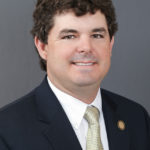The following article is an opinion piece and reflects the views of only the author and not those of AllOnGeorgia.
A measure that has already passed the Georgia House of Representatives would be tremendously detrimental to private property owners and those in the agriculture community if it clears the state senate as well. The bill has pitted agricultural and conservation groups against each other as the state legislature has worked to further protect a number of bigger agriculture companies.
House Bill 545, sponsored by House Agriculture Chairman Tom McCall, seeks to prohibit nuisance claims after one year of the establishment of an an agricultural facility, agricultural support facility, or any operation at an agricultural support facility. The bill, which targets nuisance claims exclusively in the agriculture community, provides an exception to that 1-year timeline in the event that a facility expands, changes ownership, or changes purpose only to the extent that said change or growth requires approval by a state agency or authorization by a local zoning board. An agricultural operation can be something as simple as a roadside market or honeybee farm to something more complex like the application of pesticides or the manufacturing of feed for poultry, livestock or forestry products.
OCGA 41-1-1 already defines a ‘nuisance’ as “anything that causes hurt, inconvenience, or damage to another and the fact that the act done may otherwise be lawful shall not keep it from being a nuisance. The inconvenience complained of shall not be fanciful, or such as would affect only one of fastidious taste, but it shall be such as would affect an ordinary, reasonable man.”
Simply put: Under HB 545, property owners would be prohibited from taking actions against other landowner and/or agricultural operation owners unless the action is taken within one year of the establishment of the operation, regardless of how severe the impact on the complainants property may be.
Initially, the bill’s sponsor sought to restrict the distance from the agriculture operation to ½ mile, but a floor amendment expanded that distance to ownership within 5 miles of the nuisance. Chairman McCall repeatedly told the Rules committee that the bill sought to “protect the state’s largest industry,” which is agriculture. McCall also told colleagues that the bill doesn’t eliminate the ability to sue if a facility is doing something illegal, but HB 545 makes no mention of that.
The bill mimics a 2018 North Carolina law designed to stop the ability of neighbors to pursue nuisance actions against industrial hog facilities. North Carolina farmers direct the waste of 10 million hogs into open air lagoons whose stench and water pollution have ruined many lives.
The measure in the peach state is supported by the Georgia Poultry Federation, the Georgia Urban Ag Council, the Georgia Farm Bureau, the Georgia Forestry Association, and the Georgia Agribusiness Council. While sponsored by some of Georgia’s agriculture-oriented lawmakers, the measure narrowly passed by a vote of 107-58.
So, while we talk about protecting big agricultural businesses, who is looking out for the private property owners and smaller agricultural entities adjacent to or in close proximity of those thriving mega-entities?
Right now, it seems the opposition is limited to private property owners, the US Water Coalition, the Flint Riverkeeper, and the Georgia Water Coalition, which has said, “HB 545 severely restricts the rights of individual property owners, businesses, and schools from protecting their rights against nuisances from industrial agricultural operations that move into their communities.” The Georgia Water Coalition, by the way, is comprised of over 250 organizations, including conservation groups, farmers, homeowners and lake associations, business owners, sporting clubs, professional associations, and religious groups.
April Lipscomb, an attorney with the Southern Environmental Law Center said that “HB 545 flips current law on its head” and “prevents existing land owners from protecting their property values from new and expanding agricultural operations that move into their neighborhoods.” This, in part, is a foundation for opposition because if a state agency or local zoning board doesn’t have to approve the move or expansion, the “establishment period” does not apply. This would be especially troublesome for rural counties without any zoning regulations at all.
House Minority Leader Bob Trammell told AllOnGeorgia that the bill would “substantially limit [the] ability to seek redress. In some instances, it will completely preclude the ability to seek redress. The sad irony is that it will adversely affect rural Georgians most.”
In addition to what all of the experts have said, there are a number of reason to oppose the bill, so I’ll go through them one by one.
- The Georgia House passed the measure knowing it wasn’t good legislation. In the Rules Committee on March 5th, Rules Chairman Jay Powell made it clear that he had concerns with the bill but they would work to ‘fix it in the Senate.’ Not only this an unprincipled approach to legislation, it’s also completely reckless. What if the Senate doesn’t ‘fix it’? The House can’t weigh in on anything after the fact unless the Senate actually makes a change, which would have to be approved by the House before heading to Governor Kemp’s desk.
- The distance is subjective. 5 miles is a subjective number which is contingent upon on the type of agricultural facility in a region, whether or not the facility is in close proximity to a water source, other agriculture facilities, or a farming operation, if there are tree lines or open fields…and so much more. Additionally, a landowner could be impacted at 5.25 miles in the same way someone at 4.95 miles is impacted, but only one of them would have a legal pathway to address the issue.
- The bill requires the owner of the land to file a nuisance action. Whether a landowner leases his/her property to a farmer for cultivation or to a school for other uses, the landowner may not always be the one impacted by the nuisance. Shouldn’t the wronged party have recourse?
- Some agriculture may benefit, but many others could suffer from HB 545. What Chairman McCall is failing to address in his advocacy of the bill is how others in the agriculture business will be adversely impacted by this type of legislation. While it may help the poultry producer at mile marker 101, it could negatively affect the cotton farmer at mile marker 103.
- Mere establishment of a facility does not equate to the commencement of a nuisance or harm to a neighbor. An agriculture facility may begin a practice that creates a toxic runoff to adjacent property owners two years after the facility opens, but the property owner would have no recourse because the nuisance did not begin within one year of when the facility was established.
- If it ain’t broke, don’t fix it. The current law has been in place since 1980 and properly balances the protections for all parties involved. In fact, the code section already on the books states,“It is the purpose of this Code section to reduce losses of the state’s agricultural and forest land resources by limiting the circumstances under which agricultural facilities and operations or agricultural support facilities may be deemed to be a nuisance,” which shows the laws are already in place – restrictive enough – to protect some businesses from lawsuits.
- It’s not the proper role of government. We have a court system that allows those elected and appointed to sit on a bench to weigh the facts of each individual case and make a decision based on the complaints and the statements of the defense. It is not the job of the legislature to protect a particular industry — or, in this case, a specific facet of a particular industry.
The lawsuits from these nuisance claims don’t always seek financial relief, but instead simply injunctive relief — to get whoever the nuisance is to stop doing what they are doing that is causing harm. This limits the ability to do that.
That’s why we should leave the law the way it is. The very foundation of our nation is property rights. Landowners have the right to do as you please on your own property — so long as it doesn’t negatively impact the private property of those around them. This legislation circumvents that ideology entirely and it does so while offering smaller landowners as sacrificial lambs for Georgia’s agriculture industry.
The bill has been assigned to the Senate Agriculture & Consumer Affairs committee. One hearing has already been held and it could be voted on by the committee as early as March 19th.
Here is a link to the bill.
Here is a link to the Amendment which was added from the House floor, which passed.
You can contact the Senate Agriculture & Consumer Affairs committee members by email below.
john.wilkinson@senate.ga.gov
lee.anderson@senate.ga.gov
ellis.black@senate.ga.gov
tyler.harper@senate.ga.gov
billheath@billheath.net
dean.burke@senate.ga.gov
zahra.karinshak@senate.ga.gov
sheikh.rahman@senate.ga.gov
freddie.sims@senate.ga.gov
larry.walker@senate.ga.gov
Jessica Szilagyi is a former Statewide Contributor for AllOnGeorgia.com.


Georgia News
Kemp Signs Historic Tax Cut Package Into Law

Bulloch Public Safety
Statesboro Police Dept Investigating Shooting at Vault Apartments, Two Arrested

Bulloch Public Safety
04/18/2024 Booking Report for Bulloch County

Chattooga Local News
Get Ready for the Buzz: Cicadas to Emerge

Bulloch Public Safety
03/25/2024 Booking Report for Bulloch County

Bulloch Public Safety
04/09/2024 Booking Report for Bulloch County

Bulloch Public Safety
04/01/2024 Booking Report for Bulloch County

Bulloch Public Safety
04/08/2024 Booking Report for Bulloch County

Bulloch Public Safety
04/15/2024 Booking Report for Bulloch County










